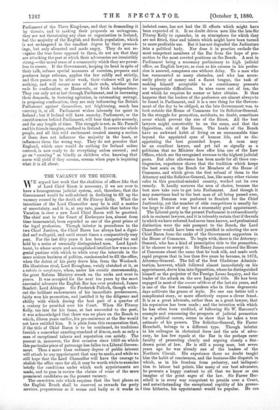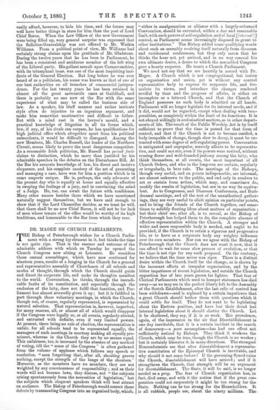THE VACANCY ON THE BENCH.
WE argued last week that the abolition of offices like that of Lord Chief Baron is necessary, if we are ever to have a homogeneous judicial system, and, therefore, that the Government would be well-advised in declining to fill up the vacancy caused by the death of Sir Fitzroy Kelly. What the intentions of the Lord Chancellor may be is still a matter of uncertainty, and it is, at any rate, possible that before the Vacation is over a new Lord Chief Baron will be gazetted. The chief seat in the Court of Exchequer has, almost from lime immemorial, been regarded as one of the great prizes of the legal profession. Though inferior in precedence to the two Chief Justices, the Chief Baron has always had a digni- , fled and well-paid, and until recent times a comparatively easy post. For the last fifty years it has been competed for and held by a series of unusually distinguished men. Lord Lynd- hurst, to whose acute and accomplished intellect law was a con- genial pastime with which to while away the intervals in the more serious business of politics, condescended to fill the office, when the defeat of his party drove him from the Woolsack. His illustrious rival, Lord Brougham, vainly clutched, at it, as a tabula in naufragio, when, under his erratic steersmanship, the great Reform Ministry struck on the rocks and went to pieces. It was occupied for the next ten years by the most successful advocate the English Bar has ever produced, James Scarlett, Lord Abinger. Sir Frederick Pollock, though with- -out the brilliant endowments of his immediate predecessors, fairly won his promotion, and justified it by the diligence and ability with which during the best part of a quarter of a century he presided over his Court. When Sir Fitzroy Kelly, too late for his fame, at last succeeded to the post, it was acknowledged that there was no place on the Bench to which, fifteen years earlier, his pre-eminence at the Bar would not have entitled him. It is plain from this enumeration that, if the title of Chief Baron is to be continued, its traditions furnish a somewhat exacting standard of fitness, such as only a man of exceptional talents and reputation can satisfy. The present is, moreover, the first occasion since 1830 on which this particular piece of patronage has fallen to a Liberal Govern- ment. Thus a more than ordinary degree of public interest will attach to any appointment that may be made, and while we still hope that the Lord Chancellor will have the courage to abolish the office once for all, it may be worth while to examine briefly the conditions under which such appointments are made, and to pass in 'review the claims of some of the more prominent candidates on the present vacancy.
The unwritten rule which requires that the best places on the English Bench shall be reserved as rewards for party services, preposterous as it seems and badly as it works in
isolated cases, has not had the ill effects which might have been expected of it. It no doubt drives men like the late Sir Fitzroy Kelly to squander, in an atmosphere for which they are not fitted, time and talents which might have been turned to more profitable use. But it has not degraded the Judicature into a political body. Nor does it in practice exclude the most competent members of the Bar from the hope of pro- motion to the most coveted positions on the Bench. A seat in Parliament being a necessary preliminary to high judicial office, an English lawyer, as soon as his success in his profes- sion is assured, compasses one without delay. To a man who has surmounted so many obstacles, and who has neces- sarily plenty of money and a fluent tongue, the task of making himself acceptable to a constituency presents no insuperable difficulties. In nine cases out of ten, the seat which he requires he sooner or later obtains. It thus happens that the leaders of the profession are almost always to be found in Parliament, and it is a rare thing for the Govern- ment of the day to be obliged, as the late Government was, to look outside the House of Commons for its Solicitor-General. In the struggle for promotion, accidents, no doubt, sometimes occur which prevent the rise of the fittest. All the best lawyers might conceivably be on the same, and that the Opposition, side of the House. The heads of the Bench have an awkward habit of living on an unreasonable time beyond the appointed span of human life, and so dis-
appointing the best grounded hopes. A man may be an excellent lawyer, and yet fail so signally as a politician that no Minister dare offer him one of the Law Offices, which are the recognised avenues to the highest judicial posts. But after allowance has been made for all these con- tingencies, experience shows that the tradition which keeps the best seats on the Bench for Members of the House of Commons, and which gives the first refusal of them to the Attorney and the Solicitor-General, has, like many other vicious rules in this practical-minded country, worked out its own remedy. It hardly narrows the area of choice, because the best men take care to get into Parliament. And though it may sometimes lead to the best man of all being passed over, as when Denman was preferred to Scarlett for the Chief Justiceship, yet the number of able competitors is usually far too large to allow of any but a reasonably good appointment.
The Liberal party in the present Parliament is extraordinarily rich in eminent lawyers, and it is tolerably certain that if the rule to which we have referred had never been known, and professional distinction were the sole passport to the Bench, the Lord Chancellor would have been well justified in selecting the new Chief Baron from the ranks of the Government supporters in the House of Commons. To begin with, there is the Attorney- General, who has a kind of prescriptive title to the promotion, if he chooses to accept it. Sir Henry James entered the House of Commons about the same that he took silk, and made such rapid progress that in less than five years he became, in 1873, Attorney-G-eneral. The fall of the first Gladstone Adminis- tration, however, which followed almost immediately on his appointment, drove him into Opposition, where he distinguished himself as the projector of the Foreign Loans Inquiry, and the leader of the attack on the new Imperial title. He has been engaged in most of the causes celebre,s of the last six years, and is one of the few forensic speakers who in these degenerate days cultivate the graces of style. No one can better tell a complicated story, or more effectively expose a clever fraud. It is as a great advocate, rather than as a great lawyer, that his reputation has been made ; and the intention with which he has often been credited, of following Sir W. Harcourt's example and renouncing the prospects of judicial promotion for a political career, seems to show that he takes a true estimate of his powers. The Solicitor-General, Sir Ferrer Herschell, belongs to a different type. Though inferiot to his colleague in rhetorical force and the arts of advo- cacy, he has few equals at the Bar in the perhaps rarer faculty of presenting clearly and arguing closely a fine- drawn point of law. He is still a young man, but seven years ago he was already one of the leaders of the Northern Circuit. His experience there no doubt taught him the habit of conciseness, and the business-like dispatch in which, as in his freedom from pedantry, and indisposi- tion to labour bad points, like many of our best advocates, he presents a happy contrast to all that we know or can imagine of the great sages of the law. Sir Parser Her- schell is in every way competent to preside over a Court, and notwithstanding the exceptional rapidity of his promo- tion hitherto, his appointment would be popular. He can easily afford, however, to bide his time, and the future may well have better things in store for him than the post of Lord Chief Baron. When the Law Offices of the new Government were being filled up, very general surprise was expressed that the Solicitor-Generalship was not offered to Mr. Watkin Williams. From a political point of view, Mr. Williams had certainly strong claims upon the gratitude of Mr. Gladstone. During the twelve years that he has been in Parliament, he has been a consistent and assiduous member of the left wing of the Liberal party. His gallant assault upon Camarvonshire, with its triumphant issue, was one of the most inspiriting inci- dents of the General Election. But long before he was ever heard of as a politician, his name was known as that of one of our best authorities on all branches of commercial jurispru- dence. For the last twenty years he has been retained in almost all the great mercantile cases at Guildhall, and there is probably no one now at the Bar with the same experience of what may be called the business side of law. As a speaker, his bluff manner and rather intricate style often do injustice to an ingenious argument, and make him somewhat unattractive and difficult to follow. But with a mind cast in the lawyer's mould, and a practical knowledge of litigation in all its forms which, few, if any, of his rivals can surpass, he has qualifications for high judicial office which altogether apart from his political antecedents, it would be difficult to disregard. Among the new Members, Mr. Charles Russell, the leader of the Northern Circuit, seems likely to prove the most dangerous competitor. As a reasonable Irish politician, Mr. Russell has prima facie claims to distinction, which he more than justified by his admirable speeches in the debates on the Disturbance Bill. At the Bar his accurate knowledge of law, his direct and incisive eloquence, and his complete mastery of the art of presenting and managing a case, have won for him a position which is in some respects unique. He is, perhaps, the only advocate of the present day who is equally at home and equally effective in swaying the feelings of a jury, and in convincing the mind of a Judge. He, too, can await the future with confidence. Many other names besides those which we have mentioned naturally suggest themselves, but we have said enough to show that if the Lord Chancellor decides, as we trust he will, that there shall be no new Chief Baron, it will not be for lack of men whose tenure of the office would be worthy of its high traditions, and honourable to the Bar from which they rose.



































 Previous page
Previous page